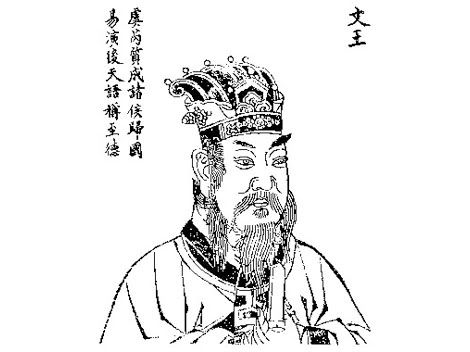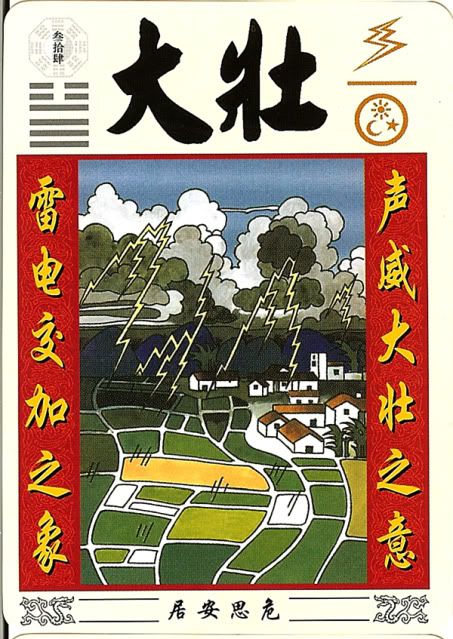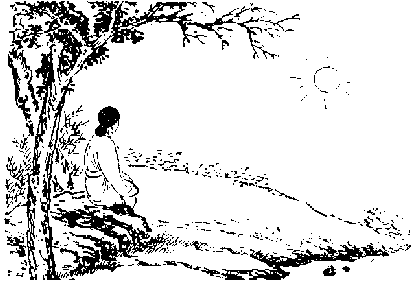Meet King Wen of Zhou:

King Wen had a profound role in illuminating the I-Ching. He began the Zhou Dynasty, which lasted for 800 years and 37 emperors.
But King Wen himself did not live to enjoy this victory over the evil King Zhou, Emperor of the Shang dynasty, who had imprisoned King Wen, fearing his influence (as he well should have!).
Today’s I-Ching reading made me think of King Wen.
The I-Ching provided Hexagram 34, “The Power of the Great” with two changing lines, transforming to Hexagram 30: The Clinging, Fire:

The hexagram of “The Power of the Great” can be confusing. What is the difference between real power and mere force?
Today, the politicians in Washington D.C. have a great deal of power, and we talk endlessly about “power politics.” We also recognize other interests, corporate and military, whose power exceeds that of our political representatives and seems to be invulnerable to the plans of those of us who are working for a better world where both the planet and the living beings upon it are valued and nurtured.
I have no doubt that some of these powerful people are strong within themselves and if stripped of their present rank would, through force, trickery and treachery, end up back in charge. I am not naive enough to think that our foes are only weaklings, though many of them are, lol.
The evil Emperor of the Shang Dynasty saw the threat to his power from the popular King Wen:
The Zhou state was located in the Wei River valley in present day Shaanxi Province. At one point, King Zhou of Shang, fearing Wen’s growing power, imprisoned him. However, many officials respected Wen for his honourable governing. So they gave King Zhou many gifts, and requested Wen ‘s release. These gifts included gold, horses and women. Zhou agreed, and Wen was released.
King Wen planned the conquest of the current dynasty in power, the Shang Dynasty, but he died before he could accomplish this.
He feared Wen’s “growing power.”
King Wen’s second son, Zhou Gong Wu ended up completing Wen’s plans and toppled the Shang Dynasty. (I apologize for the confusion of so many similar names as my knowledge of Chinese history is only that of an admirer, not a scholar).
The hexagram of “The Power of the Great” says that greatness and rightness are not separate, that you cannot have one without the other. I take that to mean that even if one is very strong, if one is not right, they can only use force, and never real power.
To use an extreme example, Hitler was able to almost conquer the world, but his reign was very short. The power he used was not inexhaustible as would be the case in the Power of the Great. There were no roots to that kind of power which, for example, in the Zhou Dynasty, allowed for 800 years of rule.
There were two changing lines in this hexagram in the reading I requested from the I-Ching, a yang line in the second place and a yin line at the top. (An I-Ching hexagram is six lines, moving from the bottom to the top, yin is a broken line and yang is an unbroken line).
The second changing line has a good augury, that “perseverance brings good fortune.” It speaks of someone who does possess great power but knows how to conserve it and not squander it.
King Wen, while he was prisoner of King Zhou of Shang, knew there would be a day of reckoning but that the time was not yet ripe. Yet he didn’t just idly wait or fear too much for his personal safety. He used the time both to plan Zhou’s overthrow and to create something marvelous:
King Wen is also known for his contributions to the Yi Jing, a manual of divination. King Wen is attributed with having stacked the eight trigrams in their various permutations, to create the sixty-four hexagrams. He is also said to have written the judgements which are appended to each hexagram (the line statements are attributed to his son, the Duke of Zhou). The most commonly used sequence of the sixty four hexagrams is attributed to King Wen and is usually referred to as the King Wen sequence.
The Zhou Dynasty is probably the dynasty that reigned for the longest period not only of all Chinese dynasties, but of the whole world. Of course, such a long period contributed to a certain image of the Zhou rulers and their institutions as the guideline for all later people.
King Wen did not dissipate his power but used it as the time warranted. After his death, his work benefited his son, who was able to continue that work and overthrow the tyrant.
The top changing line speaks of the perils of power, of how one can get caught like a goat with its horns in a hedgerow by miscalculating the times. The augury, however, is a good one as it states once one realizes the mistake, good fortune comes and one abandons a wrong plan.
I have presented an idealized portrayal of King Wen and his son, but of course they were only human beings, just like the rest of us, with their times of frustration and making mistakes. That they succeeded in changing the world shows they were able to deal with mistakes in the use of power and stop in time before disaster struck.

The hexagram changes to the hexagram of “The Clinging/Fire”.
After the successful overthrow of the Shang Dynasty, the Zhou Dynasty began an era of clarity and progress, sort of a golden age.
When one has power and uses power, it is not an end in and of itself. When power is used to remove obstacles (in this instance, a tyrant), the power dissipates in the endeavor and what remains is a radiance and clarity that should be used to create and not destroy.
Too often we have seen people use power and end up having the power use them — they can’t stop conquering, fighting, destroying. According to my subjective interpretation of the I-Ching, that is not the power of the great.
To make this shift from great power to clarity and a kind of enlightened devotion takes great spiritual adaptability and an understanding of our own minds. The exhilaration of battle can often rob one of a sense of the times, when to move forward, when to retreat, when to stay in place and build.
Devotion to the motives underlying our decision to use power is the key to mastering this kind of adaptability. We don’t fight just because we hate someone, or even hate what they are doing. We fight injustice because we love justice, not because we wish revenge (even if we DO wish revenge).
After the battle is the time to remember and put into practice what we love, what we value, our highest aspirations.
To summarize. I interpret the changes received by the I-Ching to mean we have fully identified what it is we are fighting against and there is no longer any need to stoke the anger and outrage with further examples, as they are already so ubiquitous. Our energies should instead begin to devote ourselves to the real power of our ideals, values, and love itself, allowing that inexhaustible power to work through us to change the world.

10 comments
Skip to comment form
Author
… could not have known that thousands of years later, someone not even from his continent would be writing about him.
He did what he did by acting upon what he knew to be right, even in the face of so-called “power” that mocked his every move.
she needs me.
I’ve only read the last paragraph.
It’s a good interpretation of whatever the rest says even though I don’t have time to read it right now.
I trust your powers. 🙂
Plus it doesn’t make me want to off myself.
…it was once possible for rulers to rule wisely and, indeed, people quickly understood and supported the powerful if they were wisely ruled. Today it is dramatically different. We have a system that rules–people serve that system which is esssentially a machine. No wisdom is required to run this machine. You just keep it going.
What really keeps it going? It is the fact that “the people” have lost their power of discernment. Their senses and intuitions have been systematically confused and distorted so that they can no longer perceive anything close to reality. The Tea Party movement is an example of people who know something is wrong but whose sense of understanding has been so distorted and manipulated that they have not a fucking idea about what is happening around them — not a clue. Up is down and left is right–and the rest of the people are not much better. At least the Tea Party has some sense of outrage and is willing to move in some direction. Not so with the left which has a clearer view of things as they are but lack any ability to move. No courage, little sense of history, little sense of the power of collective action, little sense of solidariy. We know we probably can do nothing because we know that few if any of us is willing to die for the cause. If you aren’t willing to die or give up all your goodies and vices for the cause of sanity–that’s all the left really wants is sanity then we’re no better than the Tea Party–they are all heart no head, we are all head no heart.
So your interpretation:
is right on. And “devote” is the real word we are missing. The ideals we hold will give us inexhaustible power–because we are, frankly, the ones who see clearly and once we start really moving then the power will come.
The I Ching talks a lot about the Inferior and Superior Man. We need to study the qualities of the Superior (Wo)Man and be very aware of the Inferior (Wo)Man in each of us–that will help us see it in others.
I have never delved into its mysteries. I’m learning. Thank you, NPK, for this wisdom